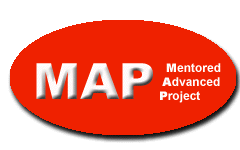
Please refer to http://www.grinnell.edu/offices/dean/map)
Four Points | Clarification | Why MAP?
Clarification
- Elective. We believe that completion of
a MAP should not be a graduation requirement, although is possible
that a department would decide to require a MAP for completion of
a major or for honors.
- Timing. Following the sentiment expressed
by faculty in the second of the faculty forums, we propose that
these mentored advanced projects be offered late in a student's academic career, specifically,
in the senior year, the summer before senior year, or, perhaps,
the junior year.
- Context. We propose that MAPs may take
place in a discipline or may be interdisciplinary. They may take
place in the context of a course or seminar, or independently. They
may take place during the academic year or during the summer.
- Distinctions. We recognize that there are some
"boundary issues" in distinguishing between MAPs
and other kinds of work. We believe that many projects that have
previously been offered as four-credit independents, four-credit
summer research projects, or concentration research projects have
the five features listed above. But not all of this previous work
would qualify, if all five features were lacking. What we propose,
then, is not simply a grand re-naming of what we have been doing
for years. Questions have also been asked about whether department
or concentration seminars would qualify as MAPs; we suggest that
although a project in a seminar might well qualify as a MAP,
the term MAP not be applied to the seminars themselves. We hope
that this distinction will make clear that the seminar project would
need to constitute a significant (perhaps close to half a semester's work) part of that work in order for it to be designated
as a MAP.
- Span. The first stage of this curricular
experiment has already indicated to us that many valuable MAP experiences
need to develop over a longer time than just one semester or one
ten-week period in the summer. We propose, therefore, that MAPs
have the potential of a span extending beyond either of these periods.
This statement was approved by the Grinnell College faculty on April 17, 2000.